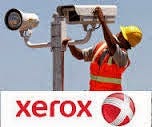New Xerox/DHS spying traffic cameras are being installed across America

Chicago’s switch to a new red-light camera vendor that uses radar technology will allow hundreds of cameras installed at busy intersections to pan in all directions — worrying civil libertarians who fear an invasion of privacy.
Adam Schwartz, a senior attorney for the American Civil Liberties Union of Illinois, said the Chicago Police Department should use the 360-degree panning technology only when there’s “suspicion of criminal activity.”
That means police should not track individuals on the street unless they’re searching for a “particular suspect,” Schwartz said.
“There is a mission creep. These cameras that were put up for the purpose of traffic enforcement now have 360-capability, which is not part of traffic enforcement, but is for other purposes,” he said. “Where we go says a lot about who we are. Whether we’re going to the union meeting, to see a criminal defense lawyer or to worship, we need safeguards to ensure that the government isn’t using these ever-expanding camera systems to monitor what people are doing.”
But Adam Collins, a police spokesman, insisted the department isn’t abusing citizens’ rights with surveillance cameras — whether they’re red-light cameras, the “blue-light” cameras in violent neighborhoods or Chicago Transit Authority cameras.
“All cameras are used for legitimate law-enforcement purposes and investigation,” Collins said.
If anyone believes this load of B/S all you have to do is look to Maryland's traffic camera scandal best described as a 'bounty system'.
Arizona-based Redflex Traffic Systems operated the city’s red-light cameras between 2003 and last year. The company relied on “loop detectors” mounted in the street. And the old cameras didn’t pan in all directions.
Unbeknownst to the ACLU, the Redflex cameras gave police access to live video — and recordings — for other law-enforcement purposes. For instance, police could spy or track anyone without the need of a warrant.
In 2013, Redflex was barred from competing for the new red-light contract amid allegations that the company showered free trips on a former city official who oversaw the contract. Redflex sent former city transportation official John Bills to the Super Bowl and other sporting events and allegedly concealed those favors from the city, according to an internal company investigation.
Xerox & DHS are working together to systematically destroy our constitutional rights.
The Vice President Client Executive for DHS Chuck Brooks has an office at Xerox!
Click here & here to read more.
Xerox works with DHS providing them with digitized immigration documents, biometric fingerprint scanners for low-income families and its share of questionable contracts with DHS.
Click here to read more.
Xerox State & Local Solutions has taken control of the city’s 352 red-light cameras, with 230 already making “the full transition” to Xerox technology, according to company spokesman Carl Langsenkamp. It’s unclear when the remainder of the cameras would be retrofitted. The Xerox cameras provide police with live video, too, but those feeds aren’t recorded — something the city is trying to change, a source said. Xerox is a $22 billion corporation.
The new radar technology includes a vast improvement. It allows the Xerox system to track a vehicle “more than 100 feet before the violation point and all the way through the intersection,” compared to just 10 feet under the Redflex system, which was vulnerable to pavement damage.
Again it's all about the money, Xerox will reap $44 million in taxpayer dollars for the right to spy on EVERY MOTORIST! Private companies, police & DHS are trampling our rights in the name of safety. No one is buying their B/S anymore.
Chicago operates 384 red-light cameras at 191 intersections which have generated more than $375 million since 2003.
Two years ago, the ACLU urged Mayor Rahm Emanuel to order a moratorium on expanding Chicago’s Big Brother network of surveillance cameras to give the city time to develop new rules to safeguard privacy. The ACLU argued that the millions of dollars spent on cameras could have been used to put more officers on the street.
The report also questioned the crime-fighting capability of cameras, noting that the 4,500 camera-assisted arrests from 2006 through May 2010 amounted to less than 1 percent of the total number of arrests over that period.
The demand for a camera moratorium was ignored. Since then, the city has added thousands of public and private sector cameras to a network that now includes 24,000 cameras. DHS has described it as one of the nation’s most extensive and integrated.
http://politics.suntimes.com/article/chicago/chicagos-red-light-cameras-expand-views-give-aclu-pause/tue-05062014-623pm


